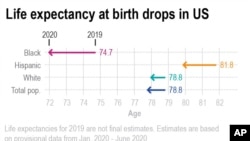The U.S. Centers for Disease Control (CDC) Thursday released statistics indicating over-all life expectancy dropped by one full year in the first half off 2020, the biggest drop since World War II.
Provisional data released by the CDC’s National Center for Health Statistics for January to June 2020 indicates minorities suffered the biggest impact, with Black Americans losing nearly three years and Hispanics, nearly two years.
Health officials say the data reflects the toll of the COVID-19 pandemic as well as a rise in deaths from drug overdoses, heart attacks and diseases that accompanied the outbreak.
The CDC calculates life expectancy based on how long a baby born today can expect to live, on average. The statistics show, overall, in the first half of last year, that was 77.8 years for Americans overall, down one year from 78.8 in 2019. For males it was 75.1 years and for females, 80.5 years.
The CDC says the last time life expectancy at birth dropped more dramatically was during World War II. The CDC indicates, based on the latest numbers, U.S. residents can now expect to live as long as they did in 2006.
Life expectancy at birth, considered a reliable barometer of a nation’s health, has risen steadily in the United States since the middle of the 20th century. It had already been known that 2020 was the deadliest year in U.S. history, with deaths topping 3 million for the first time.
The only good news in the report is that life expectancy typically bounces back quickly, because of the way it is calculated. Health experts said that when the coronavirus pandemic subsides in the United States they expect that to occur.
